If your car caught fire, you might wonder if your insurance will help. Knowing if your insurance covers fire damage is key. It can affect how much you’ll have to pay out of pocket. Let’s explore the details of car fire insurance and find the answers you need.
Why: Comprehensive car insurance generally covers fire damage, regardless of the cause, unless it’s intentionally set. Liability coverage typically doesn’t cover fire damage to your car, while collision coverage might cover fire if it resulted from a crash.
When: Your insurance covers fire damage when you file a claim promptly after the incident, providing accurate information and documentation to your insurer.
What: Comprehensive coverage is the main type of car insurance that protects against fire damage. If you have only liability or collision insurance, it’s unlikely that fire damage to your car will be covered.
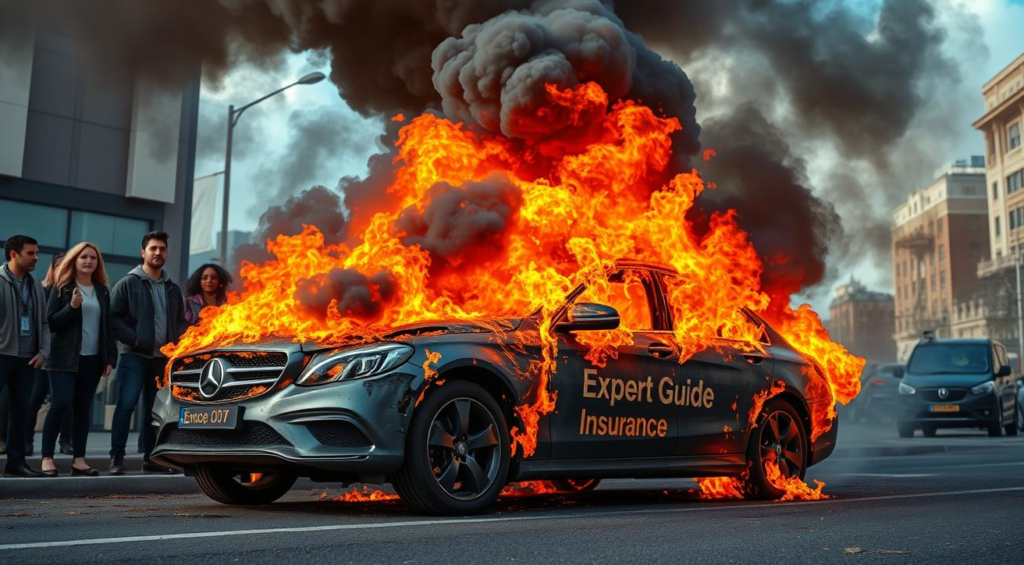
Key Takeaways
- Fire damage is usually included in comprehensive car insurance policies, but maybe not in liability only ones.
- Sometimes, the origin of the fire may decide if you can be paid under your cover. Some origins of fire might not even be covered at all, such as mechanical failures.
- Servicing your car regularly and keeping it safe may help to avoid fires. It also pays when you are making a claim on your policy.
- You have to understand what is included under your policy and what is not during a claim.
- Documentation of the incident as well as pursuing the right claims process can ensure that you get a better outcome.
Understanding Car Fires: Common Causes and Risks
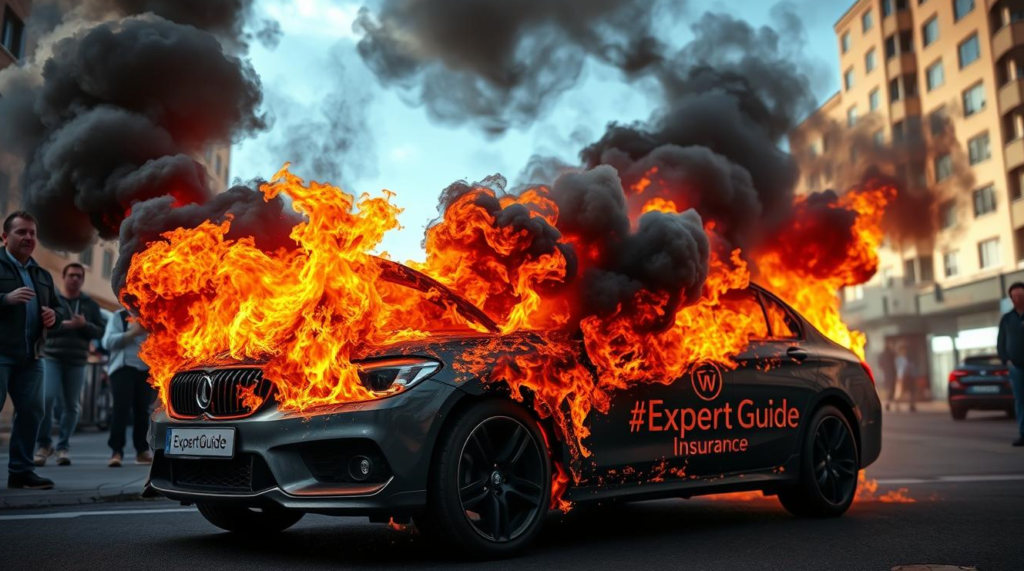
Car fires are serious and can be very dangerous. They can harm vehicle owners and others nearby. It’s important to know why car fires happen and how to stay safe. Best part is that expert guide insurance provide proper details if you want to know more.
Common Causes of Car Fires
According to the Federal Emergency Management Agency, one in every eight fires that firefighters attend involves the car. Most car fires start off with electrical or mechanical faults. The National Fire Protection Association further indicates that older cars are most prone to firebreaks since the components wear out faster.
Another outbreak of car accidents is fire, though not as frequent. A car can ignite fires from the failure of either its electrical or mechanical system, even if it is parked in a driveway.
Risks Posed by Car Fires
Car fires can cause injuries and damage property. People inside the car might get burned or inhale smoke while trying to get out. Fires can also spread quickly, putting nearby cars, buildings, and people at risk.
Regular car maintenance and repairs, even for older cars, can lower the risk of a fire. This is because small problems can turn into big fires. Taking steps to prevent fires is key to staying safe.
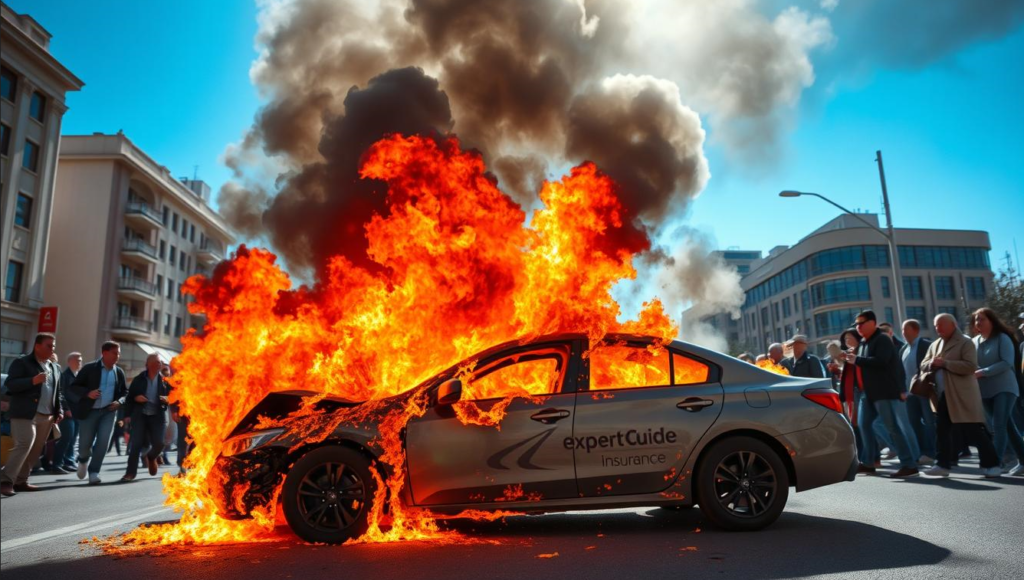
Types of Car Insurance Coverage
Protecting your vehicle is key, and knowing about car insurance coverage is essential. Each part of your policy, from liability to collision, helps keep your car safe. Let’s look at the main coverage types that might help if your car catches fire.
Liability Coverage
Liability coverage is the base of most car insurance. It covers damages to other cars and property if you’re at fault. It might not cover fire damage to your car, but it can if the fire happens in a crash.
Comprehensive Coverage
Comprehensive coverage protects your car from many non-collision issues, like theft or fires. It’s very useful if your car gets damaged or destroyed by a fire that wasn’t caused by a crash.
Collision Coverage
Collision coverage is key for crashes with other cars or objects. It might not cover fire damage directly, but it can if the fire is from a crash. This coverage helps pay for repairs or a new car if needed.
Knowing about liability coverage, comprehensive coverage, and collision coverage is important for car insurance policies. It helps protect your vehicle from car fires. Reviewing your policy and thinking about your needs can help you make smart choices. This way, you can keep your car safe and reduce financial loss from unexpected events.
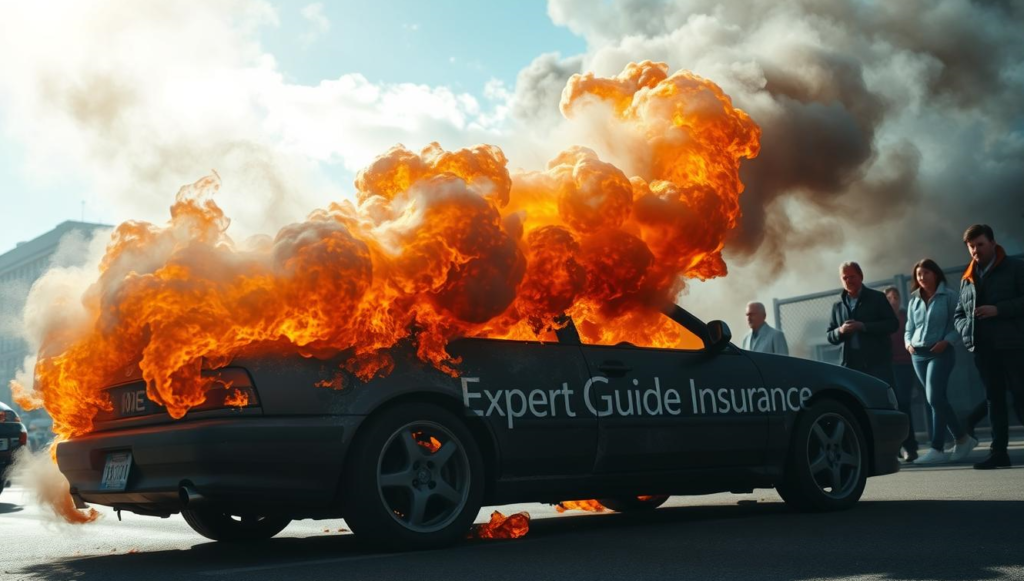
“Having the right car insurance coverage can make all the difference in the world when it comes to protecting your vehicle from the devastating effects of a fire.”
My Car Caught On Fire Will My Insurance Cover It

If your car caught on fire, you may wonder if the insurance will help. Good news is that most car insurance covers fires. However, there’s something else that you need to know.
The primary thing is why the fire happened. Generally speaking, comprehensive coverage usually covers fires, no matter the reason. However, if someone intended on setting the fire, your insurance might not cover it.
It is also important to look closely at your insurance policy. Know what is and isn’t covered. Some may not cover fires caused by specific mods on the car or if one did not properly take care of the car.
| Insurance Coverage Type | Coverage for Car Fires |
|---|---|
| Liability Coverage | Typically does not cover damages to your own vehicle from a car fire. |
| Comprehensive Coverage | Generally covers damages resulting from a car fire, regardless of the cause, unless it was intentionally set. |
| Collision Coverage | Primarily covers damages from collisions, but may also provide limited protection for fire-related damages. |
If your car catches fire, call your insurance right away. They’ll help you start the claims process. You’ll need to give them lots of details and photos of the damage.
Knowing what your insurance covers and how to prevent fires can protect you. This way, you’ll be ready if something bad happens to your car.
Factors Influencing Insurance Coverage for Car Fires

Car fires can affect your insurance coverage. If the fire was caused by something your insurance covers, like a faulty electrical system, they might help pay for damages. But, if it was caused by your own mistake or on purpose, they might not cover it.
Cause of the Fire
An estimate of more than 170,000 car fires occurs each year in the United States. Most car fires result from engine internal problems. If you have a fire, it may be covered through your insurance if you have a good enough policy. This includes theft, vandalism, and fires.
Even if your car is beyond repair, the insurance will bail you out. This applies to circumstances when damage occurred because of a fire.
Policy Terms, Conditions, and Exclusions

It’s important to read your insurance policy carefully. Look for any parts about fire damage. This includes what they will pay for, any deductibles, and extra coverage you might have.
Some things might not be covered. This includes damage you did on purpose, certain exclusions, if you cancel your policy, or if you break the rules of your policy.
Knowing how your insurance works for car fires can help you prepare. It ensures your car is safe in case of a fire.
Preventing Car Fires: Maintenance and Safety Tips
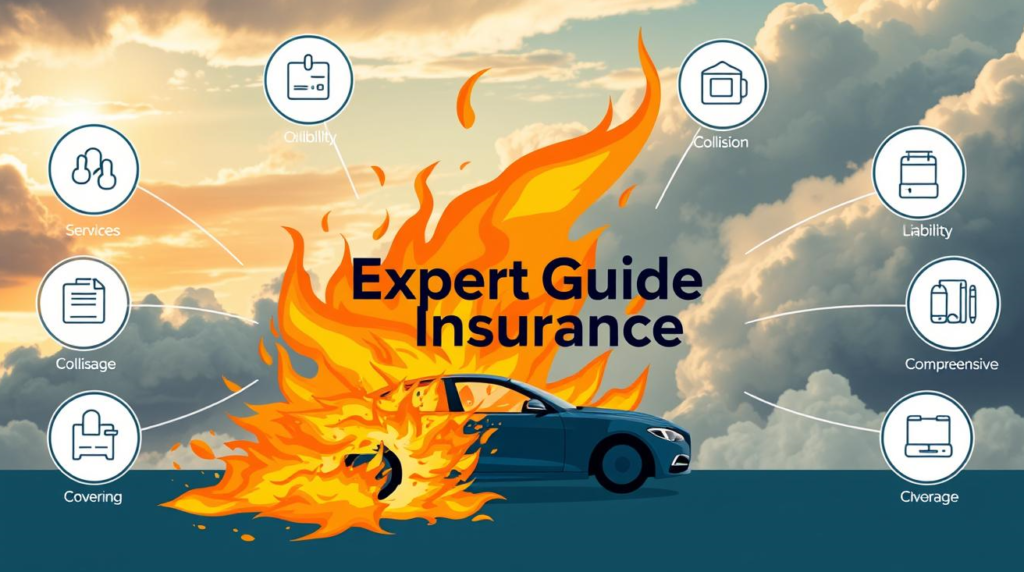
By keeping your car in good condition and following the fire safety tips you can eliminate an enemy like a Car Fire. Over 100,000 car fires occur every year, and most of these are the results of mechanical or electrical fault. Take care of your car: Of course, you can keep your vehicle in safe conditions by strictly following your car maker’s maintenance schedule.
Clean oil, proper fluid levels and a well-tuned engine are necessary to keep your car running properly. The electrical system, the battery and wiring especially; it is always important to check these constantly. Be on the lookout for signs of wear or damage and address any issue at once to prevent fires.
- Always check the electrical system of your car-from the battery to the wiring and other component-on a regular basis.
- Never put flammable contents in the car, and never smoke or use flame.
- Always clean your automobile and get rid of any rubbish that might ignite a fire.
- Always have an extinguisher available in case of emergencies.
Being careful about fire hazards can also help prevent car fires. Don’t drive recklessly, as speeding or hard braking can cause overheating and fires. If you see smoke or a burning smell, stop right away and call for help.
By following these tips, you can lower the chance of car fires. This will keep you, your car, and your property safe from the harm fires can cause.
Filing an Insurance Claim for Fire Damage
In case your car gets burnt due to fire, do not hesitate to contact your car insurance company immediately. They will ask for the cause of the fire and how much damage there is. Then an adjuster will come to inspect the car and determine its coverage under the policy.
Reporting the Incident
When you report the incident, have this info ready:
- Date, time, and location of the fire incident
- Suspected cause of the fire, if known
- Description of the damage to your vehicle
- Any steps you have already taken, such as contacting the fire department or police
Damage Assessment and Claims Processing
The adjuster will carefully check your vehicle for damage. If it’s not your fault, your insurance will process the claim. They might pay for repairs or the car’s value if it’s a total loss.
The insurance claim process for vehicle fires can change based on your policy. Make sure to understand your coverage and work with your insurance to file your claim smoothly.
Reporting the car fire damage quickly helps your insurance start your claim. By following the right steps, you can fix your insurance claim fast and get back on the road.
Supplemental Fire Insurance: Enhancing Coverage
If a car catches fire and burns down your car partially or entirely, fire insurance coverage needs to be pretty good. Any normal car insurance policy includes some type of cover against fires, but extra fire insurance will take care of your car better and give you complete peace of mind.
There is supplemental fire insurance for cars, which covers a wide variety of fire-related incidents. These things are not contained in a standard policy. It covers the contents of your car and rental car expenses until your car is repaired or replaced.
This insurance also helps with extra expenses, like lost wages during repairs. It ensures you’re covered in case of a devastating car fire. This way, you have the financial protection you need.
Whether the fire was caused by a mechanical failure, electrical issue, or something else, supplemental fire insurance has got you covered. It provides the comprehensive car insurance for fires protection you need. With this coverage, you can be confident you’re financially protected if something unexpected happens to your car.
“The average non-crash vehicle fire claim payout is $9,655, according to the most recent data from the Highway Loss Data Institute.”
When looking at car insurance options, consider the benefits of supplemental fire insurance for vehicles and additional fire coverage for cars. This valuable coverage can make a big difference in recovering from a devastating car fire incident.
Conclusion
Having the right insurance is key to protect yourself and your car from fire damage. It’s important to check and update your policy often. This helps you avoid missing out on coverage.
Also, taking care of your car and being careful with flammable items can lower fire risks. Proper storage is another way to prevent fires.
Knowing about car fire insurance is one issue that will save you, keep you informed, and stress-free. Being proactive in obtaining the right insurance will guarantee that you enter this battle against fires in your car with confidence, allowing you to focus more on what’s important: your safety and that of your family members.
Combining good insurance, regular car care, and safe practices can reduce dangers of fire significantly. By staying informed and taking precautions, you can drive safely, knowing you’re covered in case of a fire.
